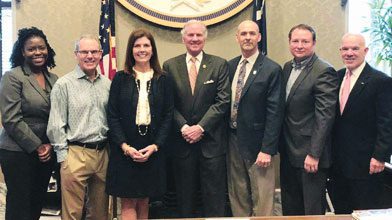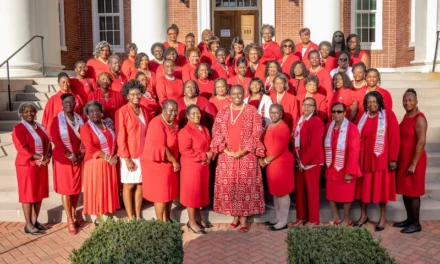 Making the Internet a safer place from right here in Beaufort
Making the Internet a safer place from right here in Beaufort
By Mindy Lucas
By now, most of us have seen the frightening video or heard the news stories.
A hacker hacks a family’s security camera and scares their young daughter in the privacy of her own bedroom.
Russian hackers break into a company that provides technology services to nursing homes across the country. They hold the company’s data hostage and demand millions in return.
And here in South Carolina, malicious malware, sent to the S.C. Department of Revenue in the form of an email attachment, causes the largest data breach against a state government agency in the history of the country.
The 2012 theft of personal data belonging to millions of residents becomes a cautionary tale for businesses and governing bodies everywhere and causes South Carolina to overhaul its own computer security practices.
While these real-life examples might seem like the most extreme of scenarios, they actually aren’t the worst that could happen when computer systems aren’t protected.
But thanks to a new initiative called the South Coast Cyber Center underway right here in Beaufort, residents in the Lowcountry may soon play a vital role in helping to combat these same sorts of attacks and disruptions.
As Beaufort City Councilman Stephen Murray explains, the demand for cybersecurity services is so great, between the government, the private sector, universities and the military, it’s become an “all hands on deck” situation.
“We’ve got some (United States) generals who have said cybersecurity is the largest threat to our national security and defense,” said Murray, who also serves as the group’s vice chairman.
What’s more, the demand for those trained in this unique field of computer technology is outstripping the supply of skilled workers.
Currently an estimated 300,000 to half-a-million job openings the field of cybersecurity are going unfilled, which is why Murray, along with retired United States Marine Col. Warren Parker, who lives here in Beaufort, are interested in helping to build a hub dedicated to developing a cybersecurity workforce right here in the Lowcountry. Parker helped spearhead the initiative after he and others like Murray realized Beaufort had many built-in elements that made it an ideal environment for cybersecurity training and education.
“Beaufort has universities, the Digital Corridor, exiting military, a significant military presence already, a great quality of life to attract people here,” Murray said. “If you put all those ingredients together, we have the makings of a cybersecurity ecosystem.”
It also aligns with the city’s strategic goals to diversify the economy, Murray said, or at least have it be less dependent on the seasonal aspects of tourism.
A hub devoted to cybersecurity could offer job opportunities to “home-grown” graduates and exiting members of the military, which would mean Beaufort could keep and attract families and professionals to stay and invest in its economy.
In 2019, approximately 2,100 trained members of the military left Parris Island, the Naval Hospital and the Marine Corps Air Station, for example.
“Many of them are invested here, have bought houses here, their kids are in school, their spouses are working in the community,” Murray said.
Still, only a fraction stay, often because Beaufort does not have the career opportunities they seek, he added.
In addition, entry level cybersecurity jobs pay on average $70,000, according to various online job sites, another attractive piece of the economic development pie.
To get the initiative off the ground, Murray and Parker brought various stakeholders together to discuss the possibilities.
Representatives from the City of Beaufort, Town of Port Royal, the University of South Carolina Beaufort, Technical College of the Lowcountry (TCL), the Beaufort Digital Corridor, the Beaufort County Economic Development Corporation and various members of the military and the private sector all met last summer to begin hammering out a plan and identify goals.
For starters, both USCB and TCL are working toward achieving the Centers of Academic Excellence in Cyber Defense designation.
A joint program sponsored by the National Security Agency and the Department of Homeland Security, a CAE designation means the United States government has essentially given its endorsement to a school’s program.
It takes a few years to work through the accreditation but both schools are in the process of applying and launching their own cybersecurity programs toward that end. At TCL, students will be able to earn an associate’s degree, and at USCB a bachelor’s degree in the field.
In fact, USCB launched its cybersecurity program just this semester and has hired a new professor to lead that program. The university plans to hire a second, but the coronavirus pandemic has delayed those plans, Murray said.
In addition, the group is working with the Beaufort County School District to introduce the basics of cybersecurity to middle and high school students there.
“Because cybersecurity training needs to happen earlier than college,” Murray said.
Members of the group are also bending the ear of those who control education funding in the state.
Earlier this year, members of its advisory board traveled to Columbia where they met with state and federal officials to lay out the reasons why it makes sense for Beaufort to be the next hub for cybersecurity.
The group made a pitch for $5 million in seed funding – what UCSB, TCL and the Beaufort Digital Corridor have estimated they would need to add the appropriate faculty, curriculum, technology and facilities.
Admittedly, USC Aiken, which has plans to construct a facility for cybersecurity on its campus, may be ahead of Beaufort since it too requested funds the year before.
But the group remains undaunted, Murray said, if only because the demand for skilled workers and expertise is so great.
“(An education) in cybersecurity is going to be as ubiquitous as education or business degrees,” Murray asserts. “You’re going to need cybersecurity programming across the country.”
The group also envisionsthe Beaufort Digital Corridor offering boot camps for adults who want to learn more and mentoring to startup companies. It will also work with the Beaufort County Economic Development Corporation to recruit existing cybersecurity firms who may be interested in relocating to the area.
In the meantime, the group has filed for nonprofit status for the South Coast Cyber Center, has been filling out its advisory board and will have a website rolling out in the new few months.
“So the idea is to bring this broad coalition of stakeholders together,” Murray said. “We’ve got government, we’ve got education, we’ve got the private sector, we’ve got nonprofits – all working together under a common mission to create a cybersecurity and cyber defense ecosystem in Beaufort.”
Rise of Cyber Attacks
Cyber attacks in America have been on the rise over the last few years, security experts say, and now that a large portion of the country’s workforce is working from home due to the coronavirus pandemic the situation has only gotten worse.
In fact, one industry association group called the increased risk to company networks a “once-in-a-lifetime opportunity for hackers and online scammers,” a recent report from CNBC noted.
The same group, or the Information Systems Security Association(ISSA), reported in late 2019 that 2.8 million professionals work in cybersecurity jobs globally, but the industry needsanother 4 million trained workers in order to close the skills gap and properly defend organizations.That includes about half a million workers needed in the U.S. to meet that demand.
Interested in learning more about the field of Cybersecurity and how you can protect your own household from a cyberattack? Visit www.ready.gov/cybersecurity.
Above: Members of the South Coast Cyber Center’s Advisory Board met with S.C. Gov. Henry McMaster, staff from the S.C. Adjunct General’s Office and other legislators earlier this year to discuss support for cybersecurity programs and training in Beaufort.






